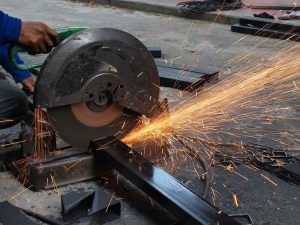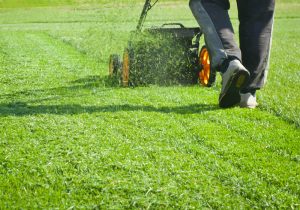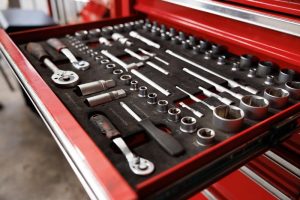Woodworking joints are the backbone of quality craftsmanship, and among these, the mortise and tenon joint stands as one of the strongest and most reliable connections in furniture making.
To create these perfect joints with precision and efficiency, a quality benchtop mortiser is an essential tool in any serious woodworker’s arsenal.
Whether you’re a hobbyist looking to upgrade your workshop or a professional seeking consistent results, finding the best benchtop mortiser can transform your woodworking experience.
In this comprehensive guide, we’ll explore what makes a great mortiser, review the best benchtop mortiser machines on the market, and provide expert insights to help you make an informed decision.
Best Benchtop Mortiser Machines Reviews/Comparisons
What is a Benchtop Mortiser?
A benchtop mortiser is a specialized woodworking machine designed to create square or rectangular holes (mortises) in wood, which are essential components of mortise and tenon joints.
Unlike larger floor-standing models, benchtop mortisers are compact enough to fit on a workbench, making them ideal for smaller workshops or woodworkers with limited space.
These machines typically feature a motor-driven chisel and bit set that hollows out clean, precise mortises, allowing for strong, professional-quality joints in furniture making, door construction, and various other woodworking applications.
What Does a Mortiser Machine Do?
A mortiser machine performs the specific task of cutting square or rectangular holes into wood pieces. It accomplishes this using a special chisel and bit set where the bit drills the center while the chisel squares off the edges.
This combination creates clean, flat-bottomed mortises that perfectly accommodate tenons for exceptionally strong joints. Mortisers excel at creating consistent, repeatable holes with crisp corners that would be difficult to achieve by hand or with standard drill bits.
This precision is crucial for furniture making, frame construction, cabinetry, and any woodworking project where strong, invisible joints are desired.
Key Factors to Consider When Buying
When selecting the best benchtop mortiser machine for your needs, several important factors should guide your decision:
- Motor Power: Look for motors between 1/2 to 3/4 HP for sufficient power to handle various wood types without straining.
- Chisel and Bit Quality: The included chisel and bit set should be made of high-quality steel and come in multiple sizes for versatility.
- Construction and Durability: Cast iron construction offers superior stability and reduces vibration compared to aluminum or steel alternatives.
- Table Size and Adjustments: A larger table provides better workpiece support, while rack-and-pinion adjustments allow for precise positioning.
- Depth Capacity: Consider the maximum mortise depth you’ll need for your projects, typically ranging from 3 to 5 inches on quality models.
- Hold-Down Features: Effective hold-downs and fences ensure your workpiece remains secure during operation, improving safety and accuracy.
- Stroke Length: A longer stroke allows for deeper mortises in a single pass, increasing efficiency.
- Brand Reputation and Warranty: Established brands often offer better customer support and longer warranties, protecting your investment.
- Price Point: Determine your budget, but remember that quality mortisers are long-term investments that can last decades with proper care.
Shop Fox W1671 Heavy-duty Benchtop Mortising Machine

The Shop Fox W1671 is a workhorse designed for serious woodworking enthusiasts and small professional shops. This heavy-duty mortiser features a powerful 3/4 HP motor and robust cast iron construction that minimizes vibration.
With its generous 5-inch head travel and multi-directional table movement, this machine offers versatility and precision for a wide range of mortising tasks.
Key Features
- 3/4 HP motor for enhanced cutting power.
- Cast iron construction for stability.
- 5-inch head travel capacity.
- Table moves 4-1/2″ left to right and 5-3/4″ front to back.
- Adjustable dovetail column.
- Quick-release chisel holder.
- Includes 4-piece chisel and bit set.
Pros
- Powerful motor handles hardwoods with ease.
- Excellent stability and minimal vibration.
- Generous table movement for versatility.
- Includes chisel and bit set.
- Good value for the features offered.
- Solid construction built for longevity.
Cons
- Assembly can be time-consuming.
- Instructions could be clearer.
- Heavier than some competing models at 97 pounds.
Hoteche Benchtop Wood Mortiser
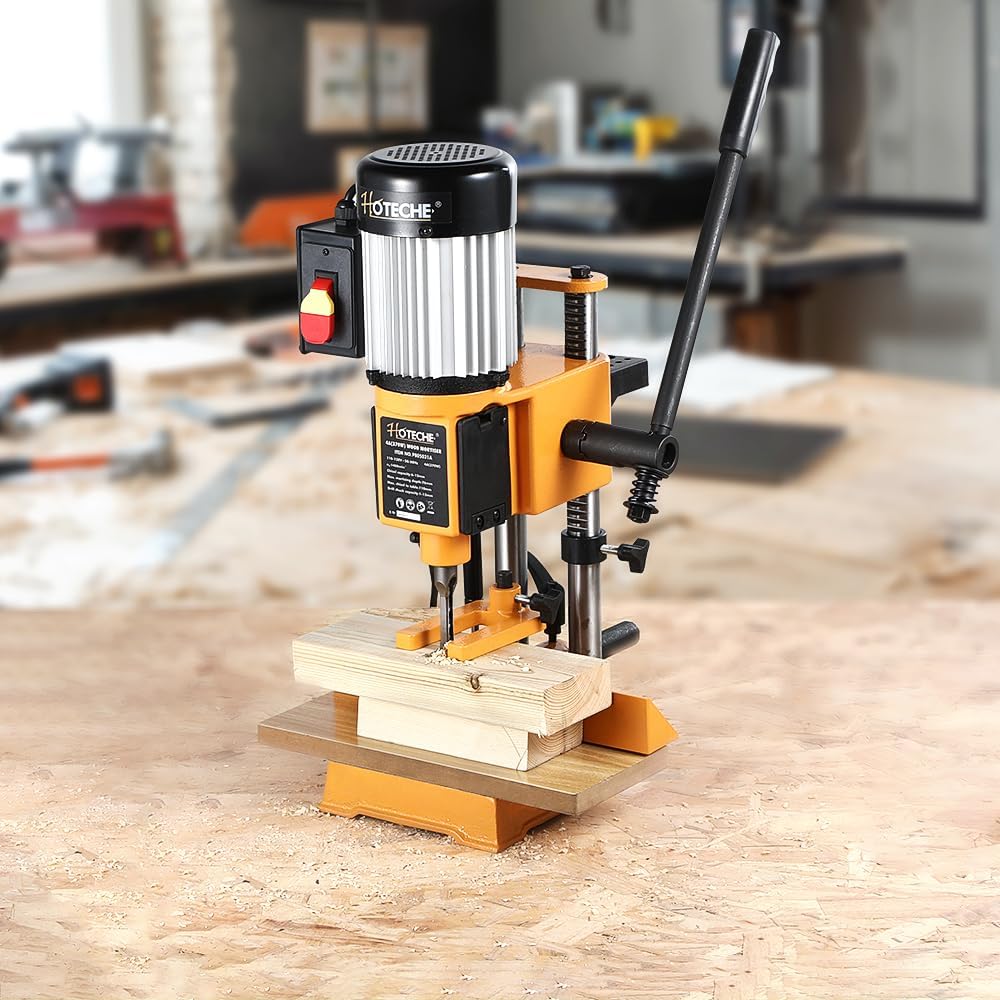
The Hoteche Benchtop Wood Mortiser is designed for woodworkers seeking an affordable yet capable mortising solution. This compact machine features a 3/4 HP motor and comes with a comprehensive 6-piece chisel and bit set, offering immediate versatility.
Its aluminum construction keeps the weight manageable while still providing adequate stability for most woodworking projects.
Key Features
- 3/4 HP motor for sufficient cutting power.
- Aluminum construction for lighter weight.
- Includes 6-piece chisel and bit set (1/4″, 5/16″, 3/8″, 1/2″, 5/8″, 3/4″).
- 4-3/4″ head stroke length.
- Adjustable depth stop.
- 360-degree rotational fence.
- Quick-release chisel holder.
Pros
- Budget-friendly price point.
- Comes with a comprehensive chisel set.
- Powerful motor for its price range.
- Lightweight at 55 pounds.
- 360-degree rotational fence adds versatility.
- Quick-release chisel holder for fast changes.
Cons:
- Aluminum construction is less stable than cast iron.
- More vibration than premium models.
- Smaller table size.
- May require more frequent adjustments.
- Not ideal for heavy-duty or professional use.
VEVOR Woodworking Powermatic Mortiser
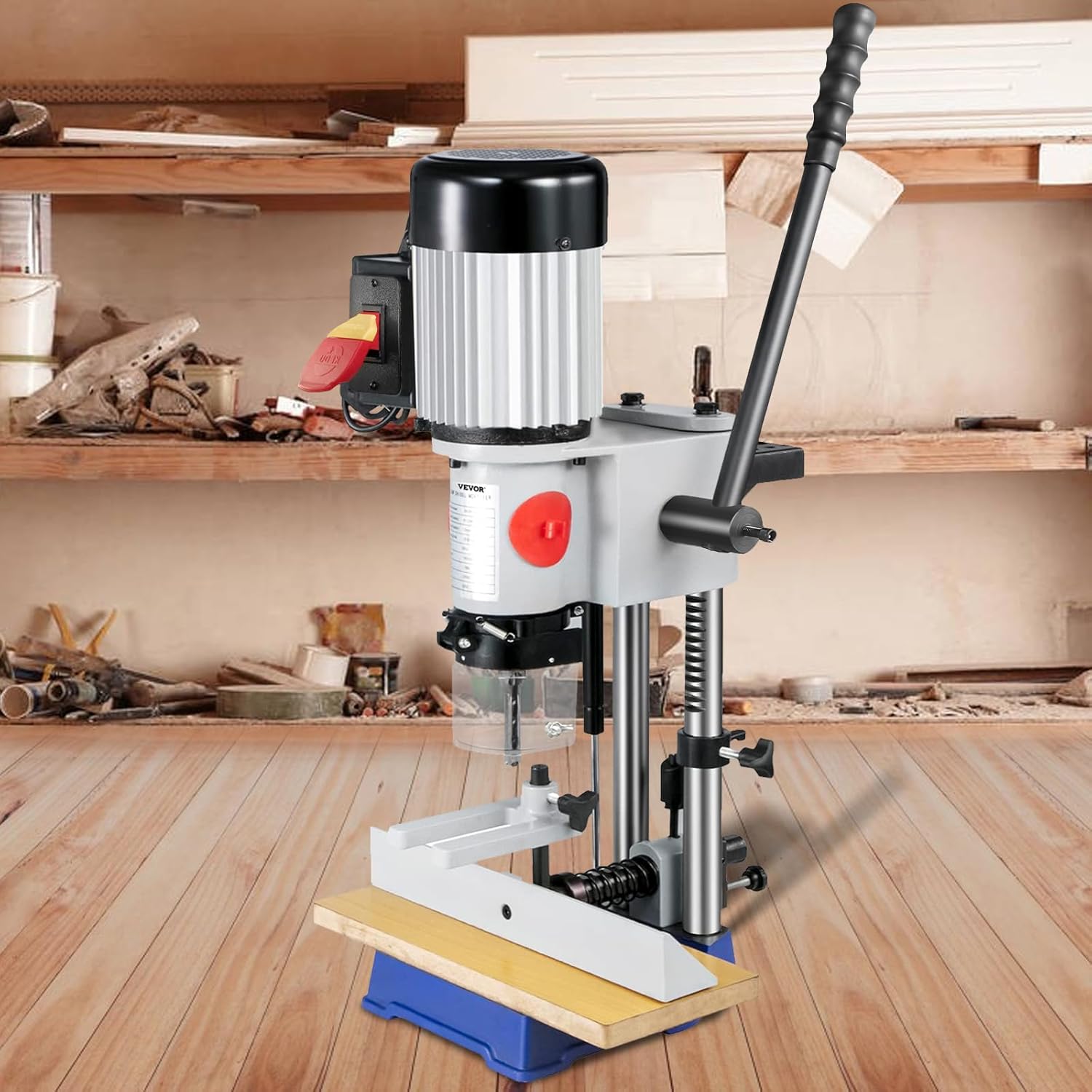
The VEVOR Woodworking Mortiser strikes a balance between affordability and functionality, catering to DIY enthusiasts and hobbyist woodworkers. This benchtop model features a 1/2 HP motor and comes with a complete 6-piece chisel and bit set, making it ready for various mortising tasks right out of the box.
Its compact design and straightforward operation make it accessible for woodworkers of all skill levels.
Key Features
- 1/2 HP motor for reliable performance.
- Cast iron base for stability.
- Includes 6-piece chisel and bit set (1/4″, 5/16″, 3/8″, 1/2″, 5/8″, 3/4″).
- 4-3/4″ head stroke length.
- Adjustable depth stop.
- 360-degree rotational fence.
- Quick-release chisel holder.
Pros
- Excellent value for money.
- Includes a comprehensive chisel and bit set.
- Compact design suitable for small workshops.
- Easy to assemble and operate.
- 360-degree rotational fence for versatile positioning.
- Lightweight at approximately 55 pounds.
Cons
- Less powerful than some competitors.
- More vibration than heavier cast-iron models.
- Smaller work surface.
- May struggle with tough woods.
- Not ideal for high-volume production work.
Generic Benchtop Mortiser Machine
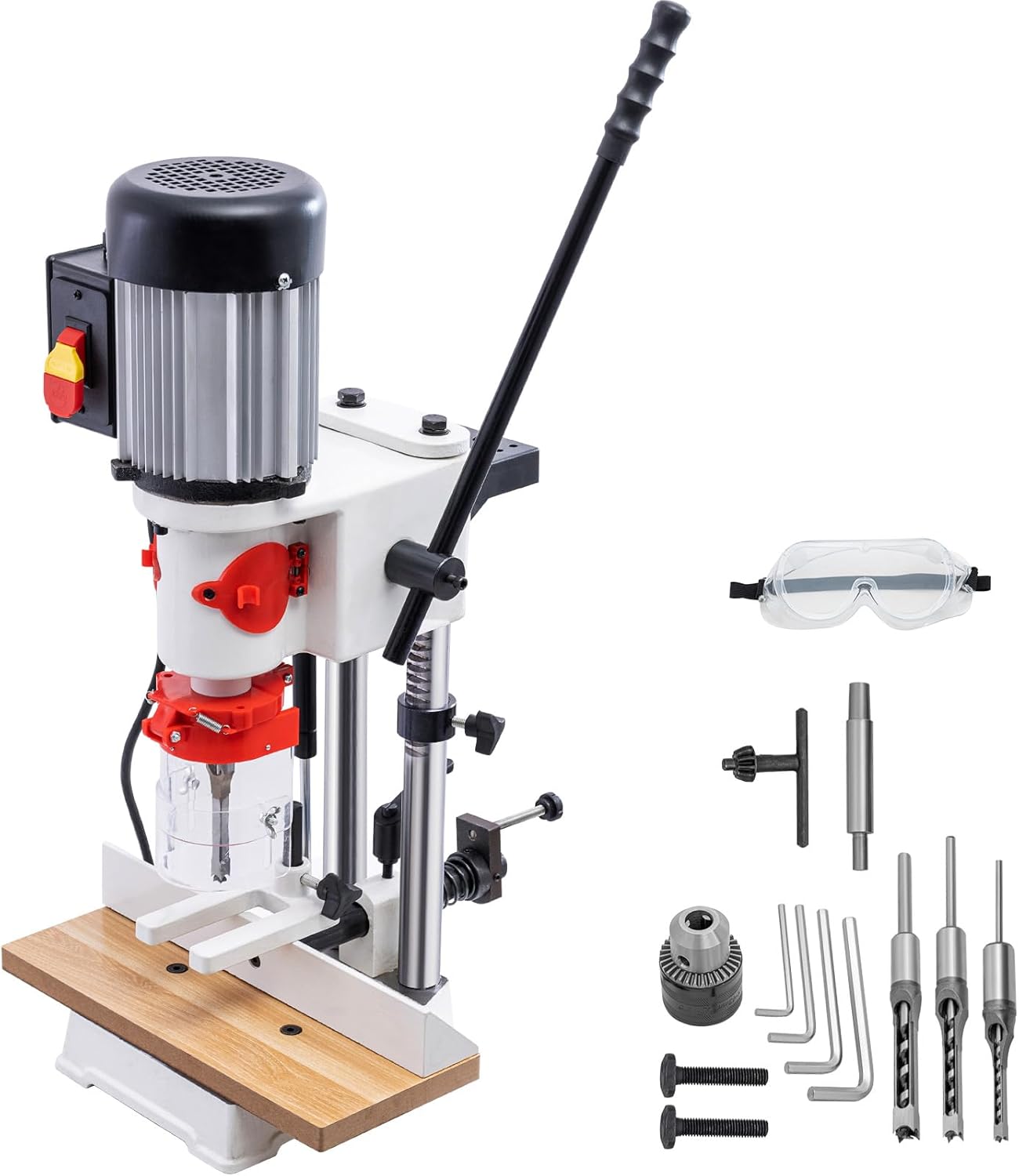
This benchtop mortiser machine provides an economical entry point into precision mortising for hobbyists and occasional woodworkers.
Featuring a 3/4 HP motor and an included chisel set, it offers the essential functionality needed for creating clean mortises in various woodworking projects.
Its simple design and straightforward operation make it accessible for beginners while still delivering satisfactory results for basic to intermediate applications.
Key Features
- 3/4 HP motor for adequate cutting power.
- Aluminum construction for a lighter weight.
- Includes 4-piece chisel and bit set.
- 4-3/4″ head stroke length.
- Adjustable depth stop.
- Rotational fence system.
- Quick-release chisel holder.
Pros
- Budget-friendly option.
- Includes essential chisels to get started.
- Lightweight and portable.
- Simple operation suitable for beginners.
- Adequate for occasional use.
- Easy to store in smaller workshops.
Cons
- Lower quality construction than premium brands.
- More vibration during operation.
- Limited precision for fine woodworking.
- Smaller table size.
- May require frequent recalibration.
- Not suitable for professional or heavy-duty use.
Happybuy Woodworking Powermatic Mortiser
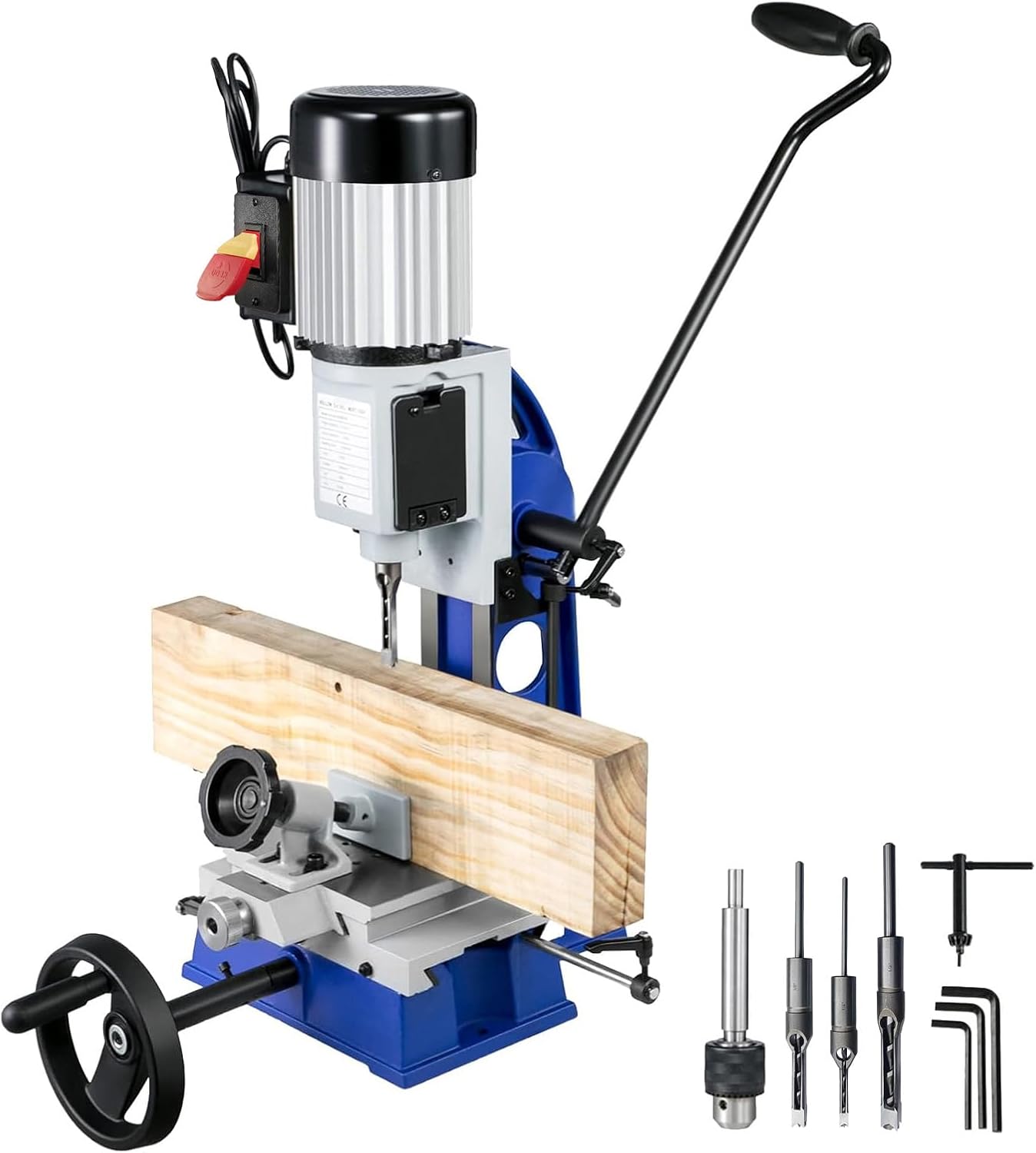
The Happybuy Woodworking Mortiser is designed for woodworkers seeking a balance between affordability and performance. This machine features a 1/2 HP motor and comes equipped with a 6-piece chisel and bit set, providing versatility for various mortising applications.
Its compact footprint and user-friendly design make it a suitable choice for home workshops and hobbyists looking to create precise mortises without investing in professional-grade equipment.
Key Features
- 1/2 HP motor for consistent cutting power.
- Cast iron base for improved stability.
- Includes 6-piece chisel and bit set (1/4″, 5/16″, 3/8″, 1/2″, 5/8″, 3/4″).
- 4-3/4″ head stroke length.
- Adjustable depth stop.
- 360-degree rotational fence.
- Quick-release chisel holder.
Pros
- Good value for the price.
- Includes a comprehensive chisel set.
- Cast iron base reduces vibration.
- Compact design suitable for small workshops.
- 360-degree rotational fence for versatility.
- Relatively easy to assemble.
Cons
- Motor may struggle with tough woods.
- Smaller table size limits workpiece support.
- Less precise than premium models.
- May require more frequent adjustments.
- Not ideal for heavy-duty or production work.
How Deep to Make Mortiser
The depth of a mortise is crucial for creating strong joints. As a general rule, mortises should be 2-3 times the thickness of the tenon. For most furniture applications, a depth of 1 to 2 inches is sufficient. However, several factors influence the ideal depth:
- Wood Type: Harder woods can support deeper mortises, while softer woods may require shallower ones to avoid splitting.
- Joint Purpose: Load-bearing joints in chairs or tables typically need deeper mortises (up to 3 inches) for maximum strength.
- Workpiece Thickness: Never exceed 2/3 of the workpiece thickness to maintain structural integrity.
- Chisel Length: The physical length of your mortising chisel will limit maximum depth.
- Glue Surface: Deeper mortises provide more surface area for glue adhesion, creating stronger joints.
For consistent results, use the depth stop on your mortiser and always make test cuts in scrap wood before working on your actual project. Remember that deeper isn’t always better—properly proportioned joints create the strongest connections.
FAQ Section
Is a mortiser machine easy to use?
Yes, benchtop mortisers are generally user-friendly, especially for those with basic woodworking experience. The learning curve is relatively gentle, with most operations involving securing the workpiece, setting the depth, and lowering the chisel with the handle.
However, achieving perfect results requires attention to detail, proper setup, and practice. Beginners should start with softer woods and simple projects to develop technique before tackling more complex mortising tasks.
Can you use a pillar drill as a mortiser?
While it’s possible to create rudimentary mortises with a pillar drill using special attachments, the results are typically inferior to those from a dedicated mortiser.
Pillar drills lack the specific mechanisms for clean, square-cornered mortises and may struggle with the lateral forces involved. Mortising attachments for drill presses exist, but they often produce less precise results and can put significant strain on the drill press.
For serious woodworking, a dedicated mortiser is strongly recommended for cleaner, more accurate results.
What is the difference between a mortiser and a drill press?
The primary difference lies in their design and function. A drill press creates round holes using a rotating bit that moves vertically. In contrast, a mortiser creates square or rectangular holes using a hollow chisel with an internal drill bit.
The chisel squares the corners as the bit removes the waste material. Mortisers are built to handle the significant lateral forces involved in this process, with more robust construction and specialized hold-down features. While drill presses are versatile for various hole-making tasks, mortisers excel at creating precise mortises for joinery work.
How to cut out a mortiser joint?
To cut a mortise joint:
- Mark the mortise location on your workpiece.
- Secure the workpiece to the mortiser table using the hold-down.
- Install the appropriate size chisel and bit set.
- Set the depth stop to your desired mortise depth.
- Position the fence and table to align with your marks.
- Turn on the machine and slowly lower the chisel into the wood.
- Make overlapping passes until the entire mortise is cut.
- Clean up any rough edges with a chisel if needed.
- Test fit your tenon to ensure proper sizing before glue-up.
What are the three rules of power tool safety?
The three fundamental rules of power tool safety are:
- Wear Appropriate Personal Protective Equipment (PPE): Always use safety glasses to protect your eyes from flying debris. Depending on the tool, you may also need hearing protection, dust masks, and gloves.
- Maintain Control and Focus: Keep your hands away from moving parts, maintain proper footing, and never operate power tools when tired or under the influence of substances that impair judgment. Always stay focused on the task at hand.
- Respect the Tool: Read and understand the manufacturer’s instructions before use. Keep tools properly maintained, use the correct accessories, and never remove safety guards. Disconnect power when changing bits or making adjustments.
These core principles, combined with specific safety guidelines for each tool, will help prevent accidents and ensure a safe woodworking experience.
Conclusion
Selecting the best benchtop mortiser machine depends on your specific needs, budget, and woodworking aspirations. For serious woodworkers and small professionals, the Shop Fox W1671 stands out as the top choice, offering exceptional power, stability, and versatility with its 3/4 HP motor and cast iron construction. While it requires more assembly effort and is heavier than other models, its performance and durability justify the investment for those who demand professional results.
Budget-conscious woodworkers will find excellent value in the Hoteche Benchtop Wood Mortiser and the VEVOR Woodworking Mortiser, both offering comprehensive chisel sets and adequate power for hobbyist projects. The Happybuy model provides a middle ground with its cast iron base, reducing vibration, while the generic benchtop mortiser offers the most affordable entry point for beginners.
Regardless of which model you choose, investing in a quality benchtop mortiser will elevate your woodworking projects, enabling you to create stronger, more professional-looking joints with efficiency and precision. Remember to consider your specific project requirements, workshop space constraints, and long-term woodworking goals when making your final decision. With proper care and maintenance, any of these top-rated mortisers can become a cornerstone of your woodworking workshop for years to come.

